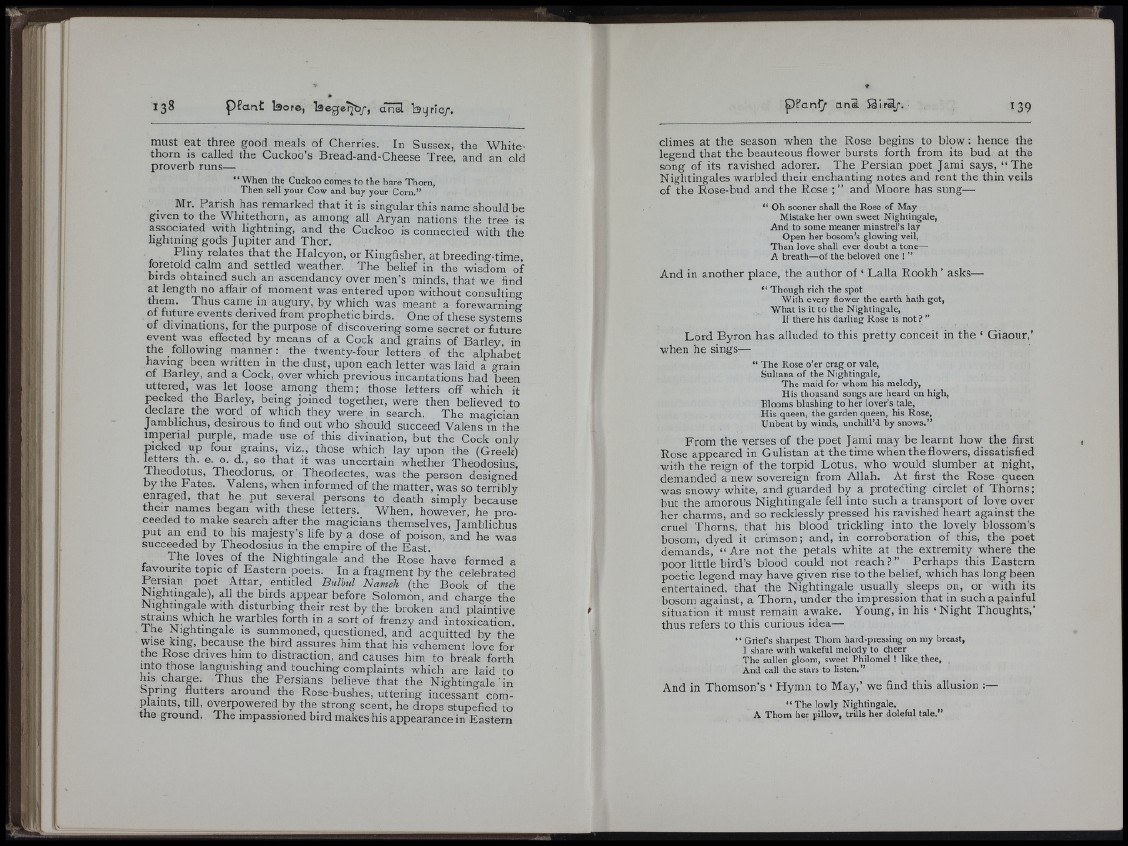
Î f
I ,
1 <
a I
must eat three good meals of Cherries. In Sussex, the Whitethorn
IS called the Cuckoo’s Bread-and-Cheese Tree, and an old
proverb runs—
“ When the Cuckoo comes to the bare Thorn,
Then sell your Cow and buy your Corn.”
^ Mr. Parish has remarked that it is singular this name should be
given to the Whitethorn, as among all Aryan nations the tree is
associated with lightning, and the Cuckoo is connected with the
lightning gods Jupiter and Thor.
Pliny relates that the Halcyon, or Kingfisher, at breeding-time,
foretold calm and settled weather. The belief in the wisdom of
birds obtamed such an ascendancy over men’s minds, that we find
at length no affair of moment was entered upon without consulting
them. Thus came in augury, by which was meant a forewarning
of future events derived from prophetic birds. One of these systems
of divinations, for the purpose of discovering some secret or future
event was effected by means of a Cock and grains of Barley, in
toe following manner: the twenty-four letters of the alphabet
havmg been written in the dust, upon each letter was laid a grain
of Barley, and a Cock, over which previous incantations had been
u t t je d , was let loose among them; those letters off which it
j c j d the Barley, being joined together, were then believed to
J c l a r e the word of which they were in search. The magician
Jambhchus, desirous to find out who should succeed Valens in the
imperial purple, made use of this divination, but the Cock only
picked up four grains, viz., those which lay upon the (Greek)
letters th. e. o. d., so that it was uncertain whether Theodosius,
Theodotus, Theodorus, or Theodectes, was the person designed
by the Fates. Valens, when informed of the matter, was so terribly
enraged, that he put several persons to death simply because
their names began with these letters. When, however, he proceeded
to make search after the magicians themselves, Jamblichus
put an end to his majesty’s life by a dose of poison, and he was
succeeded by Theodosius in the empire of the Fast.
The loves of the Nightingale and the Rose have formed a
Hvounte topic of Eastern poets. In a fragment by the celebrated
Persian poet Attar, entitled Bulbul Nameh (the Book of the
Nightmgale), all the birds appear before Solomon, and charge the
Nightingale with disturbing their rest by the broken and plaintive
warbles forth in a sort of frenzy and intoxication.
Ihe Nightmgale is summoned, questioned, and acquitted by the
wise king, because the bird assures him that his vehement love for
the Rose drives him to distraction, and causes him to break forth
into those languishing and touching complaints which are laid to
ms char J . Thus the Persians believe that the Nightingale in
Spring flutters around the Rose-bushes, uttering incessant complaints,
till, ovmpqwered by the strong scent, he drops stupefied to
the ground. The impassioned bird makes his appearance in Eastern
climes at the season when the Rose begins to blow : hence the
legend that the beauteous fiower bursts forth from its bud at the
song of its ravished adorer. The Persian poet Jami says, “ The
Nightingales warbled their enchanting notes and rent the thin veils
of the Rose-bud and the Rose ; ” and Moore has sung—
“ Oh sooner shall the Rose of May
Mistake her own sweet Nightingale,
And to some meaner minstrePs lay
Open her bosom’s glowing veil,
Than love shall ever doubt a tone—
A breath—of the beloved one ! ”
And in another place, the author of ‘ Lalla Rookh ’ asks—
“ Though rich the spot
With eveiy flower the earth hath got,
What is it to the Nightingale,
If there his darling Rose is not ? ”
Lord Byron has alluded to this pretty conceit in the ‘ Giaour,’
when he sings—
“ The Rose o’er crag or vale,
Sultana of the Nightingale,
The maid for whom his melody,
His thousand songs are heard on high,
Blooms blushing to her lover’s tale,
His queen, the garden queen, his Rose,
Unbent by winds, unchill’d by snows.”
From toe verses of toe poet Jami may be learnt how the first
Rose appeared in Gulistan at the time when the fiowers, dissatisfied
with the reign of the torpid Lotus, who would slumber at night,
demanded a new sovereign from Allah. At first the Rose queen
was snowy white, and guarded by a protedting circlet of Thorns ;
but the amorous Nightingale fell into such a transport of love over
her charms, and so recklessly pressed his ravished heart against the
cruel Thorns, that his blood trickling into the lovely blossom’s
bosom, dyed it crimson; and, in corroboration of this, the poet
demands, “ Are not the petals white at the extremity where the
poor little bird’s blood could not reach ? ” Perhaps this Eastern
poetic legend may have given rise to the belief, which has long been
entertained, that the Nightingale usually sleeps on, or with its
bosom against, a Thorn, under the impression that in such a painful
situation it must remain awake. Young, in his ‘ Night Thoughts,’
thus refers to this curious idea—
“ Griefs sharpest Thorn hard-pressing on my breast,
I share with wakeful melody to cheer
The sullen gloom, sweet Philomel ! like thee,
And call the stars to listen.”
And in Thomson’s ‘ Hymn to May,’ we find this allusion :—
“ The lowly Nightingale,
A Thom her pillow, trills her doleful tale.